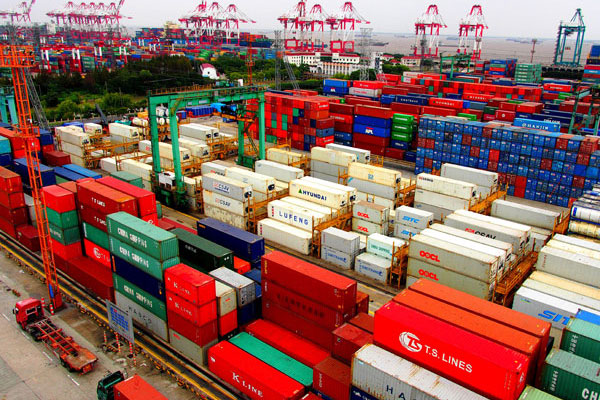Home> News
China rolls out measures to increase exports
Updated: 2016-05-10
( China Daily )
 |
|
Containers pile up at Waigaoqiao Port in the Shanghai Free Trade Zone. [Photo/Xinhua] |
China's trade conditions remain "complex and rigorous" amid more global market uncertainties that have disrupted the trade performance so far this year.
This was spelled out in a guideline document released by the State Council on Monday.
The State Council stresses in the document that governments at all levels should improve efficiency in 14 areas.
These include optimizing tax refund policies for certain exports, enhancing export credit insurance, and offering more financial support to Chinese manufacturers.
Exports in yuan-denominated terms increased by 4.1 percent year-on-year and imports fell by 5.7 percent, according to the General Administration of Customs.
Lin Guijun, a professor of international trade at the University of International Business and Economics in Beijing, said, "In addition to weak global demand, other uncertainties, such as fluctuation of foreign currencies and policy adjustment in major economies, had an impact on global trade and China's foreign trade volume last month.
"China's goal to increase import volume over the next five years will stimulate service trade opportunities for developed countries, as the government is offering wider market access to global companies," Lin said.
The service trade refers to the sale and delivery of intangible products, such as tourism, financial services and telecommunications services.
The guideline states that other new measures, such as cross-border e-commerce, multimodel logistics services and the government procurement trade, will also help private companies to diversify their global sales channels to enhance their earning ability under the current global business situation.
The government will support high-end manufacturing industries to build after-sales stations or centers and training schools overseas to improve their brand influence.
China's four pilot free trade zones in developed coastal areas, including Shanghai and Guangdong, are spearheading structural reforms to make it easier to start businesses and grant foreign companies more access to the service sector.
Loosened capital controls and wider access to sectors that remain closed or restricted to foreign companies elsewhere triggered a surge in new business registrations and cross-border transactions in these zones between January and April.
Denis Depoux, deputy president of Roland Berger Strategy Consultants for Asia, said China's policymakers will be increasingly evaluating economic, environmental and operational efficiency, and upgrading manufacturing facilities toward more automated, digitally controlled and responsive factories.














